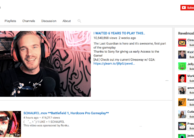|
From Elon Journal of Undergraduate Research in Communications VOL. 5 NO. 2 How Christian Leaders Interact with Twitter
By Zachary Horner
Elon Journal of Undergraduate Research in Communications
2014, Vol. 5 No. 2 | pg. 1/3 | »
This paper explores the relationship between Christian leaders and Twitter. Twitter’s founding resulted in an outburst in the use of the social media platform. Christian leaders quickly caught on, and today they use Twitter for a number of different purposes, seeking first and foremost to challenge and inspire their followers. Through the study of 30 different leaders’ tweets, as well as different blog posts, articles and interviews outlining different approaches to Twitter and other social media, the study concluded that pastors were most concerned with getting across the basic message of Christianity while adapting their methods to include the new medium of Twitter.
Since its launch in 2006, Twitter has been a leader in the Internet socialization of the world, greatly fulfilling its mission: “To give everyone the power to create and share ideas and information instantly, without barriers.” With 500 million Tweets sent per day by 241 million monthly active users, it has penetrated modern society to a degree once known only by MySpace and Facebook.1
Christian pastors, to a degree, are no different. And some of them get more interaction on Twitter than pop star Justin Bieber. In June 2012, Amy O’Leary published a story in The New York Times titled “Christian Leaders Are Powerhouses on Twitter,” writing about how influential pastors and Christian speakers such as Joyce Meyer, Joel Osteen and Max Lucado were generating more reactions on Twitter than Bieber. Even though Meyer had just 993,000 followers as compared to Bieber’s 22.6 million followers at the time, Meyer generated 170 reactions per 50,000 followers, while Bieber had just 59. This discovery resulted in Twitter executives encouraging more religious leaders to join the platform.
The company executive Claire Diaz-Ortiz “. . . spends half of her time on the road, offering training, analytics and help to swat away impostor accounts, as well as encouraging leaders to be less promotional and more personal in their posts,” O’Leary wrote. “Pastors tell me,” Diaz-Ortiz said, “Twitter is just made for the Bible.”2
So if Twitter is “just made” for pastors’ main source material, and some Christian speakers are generating more reaction from followers than pop stars, a study into the impact Christian pastors have on the social media platform would be worthwhile along with investigation into the collision of religion and culture in today’s society. How involved Christians should be in “secular culture” is an on-going debate in the evangelical world. For some, Twitter is worthy of their time. In a blog post on DesiringGod.org, John Piper wrote, “In spite of all the dangers, Twitter seems like a risk worth taking. ‘All things were created through Christ and for Christ’ (Colossians 1:16). The world does not know it, but that is why Twitter exists, and that’s why I tweet.”3
The most important question this paper examined was how and why pastors and other Christian leaders used Twitter? It will also examine individual stories of pastors and Twitter and what Twitter means for the Christian community.
Christians pastors/theologians/other leaders use Twitter, but there are not many concrete resources on this topic. The majority of information come from blog posts and other Internet-based sources, evidence of how religious thoughts are communicated in this current age.
Many resources were pulled from the evangelical Christian websites The Gospel Coalition and Desiring God. Members of The Gospel Coalition describes themselves this way: “We are a fellowship of evangelical churches in the Reformed tradition deeply committed to renewing our faith in the gospel of Christ and to reforming our ministry practices to conform fully to the Scriptures. . . . We have committed ourselves to invigorating churches with new hope and compelling joy based on the promises received by grace alone through faith alone in Christ alone.”4
The website has several regular bloggers, plus many guest posts. In the list of sources from The Gospel Coalition used for this paper are blog posts from Trevin Wax, Kevin DeYoung, Joe Carter and Dustin Neeley, among others. Desiring God is a ministry started by John Piper, the former pastor of Bethlehem Baptist Church in Minneapolis, Minnesota. There are a couple articles from that website that will be used. Since Piper is one of the most prominent sources on the tweeting side of things, a couple interviews with him about his social media use, and posts and interviews from others, are vital.
Big-time newspapers have also contributed to the research. Amy O’Leary wrote a story for The New York Times titled “Christian Leaders Are Powerhouses on Twitter.” O’Leary writes about the popularity of accounts like Joyce Meyer and Joel Osteen, who averaged more reactions per 50,000 followers than Justin Bieber. She also quotes pastors and other Christian authors and speakers whose quotes are helpful. The Los Angeles Times also published a story on popular preacher Rick Warren and his use of Twitter and Facebook last year to share a sermon about loss in the week following the suicide of his son Matthew back in April 2013.
The articles gives an overview of how Warren used Twitter and Facebook to thank those who offered words of consolation and express moments of sorrow to his followers. Likewise, Christianity Today has contributed several articles, including Sarah Pulliam Bailey’s report from the 2011 Catalyst Conference, at which Twitter executive Claire Diaz Ortiz reached out to pastors and other attendees to try to help them use the social media network better.
Ed Stetzer’s “The Exchange” blog on Christianity Today is also a popular source of information for the author’s paper. Guest posts from Clark Campbell (“Social Ecclesia: Spirit-Led Digital Presence”) and Justin Wise (“Social Media and Christian Ministry: Reaching the World for the Kingdom of God”) are two sources of good insight from pastors on how the Christian church should and is using Twitter to reach their congregants and others. Stetzer frequently writes and speaks on Christianity and social media. Wise wrote a book entitled The Social Church, a look at how the church should approach new opportunities the social media growth has provided. Stetzer also has written and commented extensively on the subject.
The first series of resources will be Twitter pages themselves. I have decided on 30 Twitter users:
Table 1. Twitter accounts for church/ministry
| Name |
Twitter Handle |
Church/Ministry |
Location |
Followers as of March 24, 2014
|
| Albert Mohler |
@albertmohler |
Southern Baptist Theological Seminary |
Louisville, Ky. |
77,578 |
| Andy Stanley |
@AndyStanley |
North Point Community Church |
Alpharetta, Ga. |
367,329 |
| Beth Moore |
@BethMooreLPM |
Living Proof Ministries |
Houston, Texas |
Houston, Texas |
| Brian Houston |
@BrianCHouston |
Hillsong Church |
Sydney, Australia |
335,571 |
| C.J. Mahaney |
@CJMahaney |
Sovereign Grace Church |
Louisville, Ky. |
40,467 |
| Chuck Swindoll |
@chuckswindoll |
Stonebriar Community Church |
Frisco, Texas |
71,429 |
| Craig Groeschel |
@craiggroeschel |
Lifechurch.tv |
Oklahoma City, Okla. |
198,152 |
| David Platt |
@plattdavid |
The Church at Brook Hills |
Birmingham, Ala. |
245,016 |
| Greg Laurie |
@greglaurie |
Harvest Christian Fellowship |
Riverside, Calif. |
80,326 |
| J.D. Greear |
@jdgreear |
The Summit Church |
Raleigh, N.C. |
42,250 |
| James MacDonald |
@jamesmacdonald |
Harvest Bible Chapel |
Chicago, Ill. |
90,374 |
| Jefferson Bethke |
@jeffersonbethke |
Author, YouTube star for spoken word |
Tacoma, Wash. |
134,205 |
| Joel Oste |
@JoelOsteen |
Lakewood Church |
Houston, Texas |
2,490,596 |
| John Piper |
@JohnPiper |
Bethlehem Baptist Church |
Minneapolis, Minn. |
604,201 |
| Joshua Harris |
@HarrisJosh |
Covenant Life Church |
Gaithersburg, Md. |
80,217 |
| Joyce Meyer |
@JoyceMeyer |
Joyce Meyer Ministries |
St. Louis, Mo. |
2,692,271 |
| Judah Smith |
@judahsmith |
The City Church |
Seattle, Wash. |
291,227 |
| Kevin DeYoung |
@RevKevDeYoung |
University Reformed Church |
East Lansing, Mich. |
42,872 |
| Louie Giglio |
@louiegiglio |
Passion City Church |
Atlanta, Ga. |
434,402 |
| Mark Dever |
@MarkDever |
Capitol Hill Baptist Church |
Washington, D.C. |
47,336 |
| Mark Driscoll |
@PastorMark |
Mars Hill Church |
Seattle, Wash. |
467,843 |
| Matt Chandler |
@MattChandler74 |
The Village Church |
Dallas-Ft. Worth, Texas |
263,053 |
| Max Lucado |
@MaxLucado |
Oak Hills Church |
San Antonio, Texas |
935,375 |
| Perry Noble |
@perrynoble |
Newspring Church |
Anderson, S.C. |
110,844 |
| Ravi Zacharias |
@RaviZacharias |
Ravi Zacharias International Ministries |
Norcross, Ga. |
134,904 |
| Rick Warren |
@RickWarren |
Saddleback Church |
Lake Forest, Calif. |
1,340,512 |
| Russell Moore |
@drmoore |
President, Ethics & Religious Liberty Commission |
Washington, D.C. |
44,025 |
| Steven Furtick |
@stevenfurtick |
Elevation Church |
Charlotte, N.C. |
198,399 |
| T.D. Jakes |
@BishopJakes |
The Potter’s House |
Dallas, Texas |
1,410,267 |
| Tullian Tchividjian |
@PastorTullian |
Coral Ridge Presbyterian Church |
Ft. Lauderdale, Fla. |
82,074 |
These are some of the most popular Twitter accounts in all Christianity. Meyer, Osteen, Jakes and Warren have all eclipsed one million followers; Piper, Driscoll and Chandler are popular names in evangelical Christian circles; and Bethke, Mohler and Moore provide different perspectives as non-pastors. Tabulating tweet types and follower counts are the primary pieces of information from these accounts, and there will be interpretations about leaders’ tweeting from these numbers.Continued on Next Page »
Amy O’Leary, “Christian Leaders Are Powerhouses on Twitter,” The New York Times, June 2, 2012, accessed March 15, 2014,http://www.nytimes.com/2012/06/02/technology/christian-leaders-are-powerhouseson-twitter.html?_r=1&.
Clark Campbell, “Social Ecclesia: Spirit-Led Digital Presence,” The Exchange, January 24, 2014, http://www. christianitytoday.com/edstetzer/2014/january/social-ecclesia-spirit-led-digital-presence.html.
Drew Dyck and Kyle Rohane, “Not Tweeting? Repent!,” Leadership Journal, Summer 2013, http://www.christianitytoday.com/le/2013/summer/not-tweeting-repent.html.
Dustin Neeley, “Justification by Twitter,” TGC Voices, May 9, 2012, http://thegospelcoalition.org/blogs/tgc/2012/05/09/justification-by-twitter/.
Ed Stetzer, “How Should We Engage Culture?,” The Exchange, April 16, 2010, http://www.christianitytoday.com/edstetzer/2010/april/how-should-we-engage-culture.html.
Gary Hendrix, interview with Zachary Horner, Burlington, N.C., April 11, 2014.
Jefferson Bethke, e-mail message to the author, March 15, 2014.
Joe Carter, “9 Things You Should Know About Social Media,” TGC Voices, July 17, 2013, http://thegospelcoalition.org/blogs/tgc/2013/07/17/9-things-you-should-know-about-social-media/.
John Piper, “Who Is In Charge of Your @JohnPiper Twitter Account?,” Desiring God, January 2, 2010, http://www.desiringgod.org/interviews/who-is-in-charge-of-your-johnpiper-twitter-account.
John Piper, “Why and How I Am Tweeting,” Desiring God, June 3, 2009, http://www.desiringgod.org/articles/why-and-how-i-am-tweeting.
Justin Wise, The Social Church (Chicago: Moody Publishers, 2014).
Justin Wise, “Social Media and Christian Ministry: Reaching the World for the Kingdom of God,” The Exchange, February 21, 2014, http://www.christianitytoday.com/edstetzer/2014/february/social-mediaand-christian-ministry-reaching-world-for-king.html.
Kevin DeYoung, “The One Indispensable Rule for Using Social Media,” DeYoung, Restless, and Reformed, June 13, 2012, http://thegospelcoalition.org/blogs/kevindeyoung/2012/06/13/the-one-indispensablerule-for-using-social-media/.
Kurt Streeter and Joseph Serna, “Rick Warren uses Facebook, Twitter to share sermon about loss,” Los Angeles Times, April 12, 2013, accessed March 15, 2014, http://articles.latimes.com/2013/apr/12/local/la-me-ln-rick-warren-leads-sermon-in-loss-using-facebook-twitter-20130412.
Melissa Kimiadi, “Cuba Case Study: Bonhoeffer-Inspired Pastor Arrested After Blogs, Tweets, and D.C. Trip,” Christianity Today, January 20, 2014, http://www.christianitytoday.com/gleanings/2014/january/cubacase-study-pastor-mario-lleonart-arrested-csw.html.
Sarah Pulliam Bailey, “Twitter Reaches Out to Christian Leaders at Catalyst’s ‘Be Present’ Conference,” Christianity Today, October 7, 2011, http://www.christianitytoday.com/ct/2011/octoberweb-only/twittercatalyst.html.
Tony Reinke, “Serving Up Tweets: An Interview with Ray Ortlund on Social Media,” Desiring God, March 9, 2012, http://www.desiringgod.org/blog/posts/serving-up-tweets-an-interview-with-ray-ortlund-on-social-media.
Trevin Wax, “4 Things a Pastor Should Consider Before Engaging Social Media,” Kingdom People. February 3, 2014, http://thegospelcoalition.org/blogs/trevinwax/2014/02/03/4-things-a-pastor-should-considerbefore-engaging-social-media/.
Endnotes
- “Company,” Twitter, accessed April 12, 2014, https://about.twitter.com/company.
- Amy O’Leary, “Christian Leaders Are Powerhouses on Twitter,” The New York Times, June 2, 2012,accessed March 15, 2014, http://www.nytimes.com/2012/06/02/technology/christian-leaders-arepowerhouses-on-twitter.html?_r=1&.
- John Piper, “Why and How I Am Tweeting,” Desiring God, June 3, 2009, http://www.desiringgod.org/articles/why-and-how-i-am-tweeting.
- “About,” The Gospel Coallition, http://thegospelcoalition.org/about/who.
- Jefferson Bethke, “Why I Hate Religion, But Love Jesus,” YouTube, January 2012, https://www.youtube.com/watch?v=1IAhDGYlpqY#!.
- amazon.com, “Jesus > Religion: Why He Is So Much Better Than Trying Harder, Doing More, and Being Good Enough,” Accessed April 12, 2014, http://www.amazon.com/Jesus-Religion-Better-Trying-Harder/dp/1400205395.
- Jefferson Bethke, e-mail message to the author, March 15, 2014.
- Sarah Pulliam Bailey, “Twitter Reaches Out to Christian Leaders at Catalyst’s ‘Be Present’ Conference,” Christianity Today, October 7, 2011, http://www.christianitytoday.com/ct/2011/octoberweb-only/twittercatalyst.html.
- Trevin Wax, “4 Things a Pastor Should Consider Before Engaging Social Media,” Kingdom People. February 3, 2014, http://thegospelcoalition.org/blogs/trevinwax/2014/02/03/4-things-a-pastor-should-considerbefore-engaging-social-media/.
- Joe Carter, “9 Things You Should Know About Social Media,” TGC Voices, July 17, 2013, http://thegospelcoalition.org/blogs/tgc/2013/07/17/9-things-you-should-know-about-social-media/.
- Bethke, e-mail interview.
- Clark Campbell, “Social Ecclesia: Spirit-Led Digital Presence,” The Exchange, January 24, 2014, http://www.christianitytoday.com/edstetzer/2014/january/social-ecclesia-spirit-led-digital-presence.html.
- Tony Reinke, “Serving Up Tweets: An Interview with Ray Ortlund on Social Media,” Desiring God, March 9, 2012, http://www.desiringgod.org/blog/posts/serving-up-tweets-an-interview-with-ray-ortlund-on-social-media.
- Drew Dyck and Kyle Rohane, “Not Tweeting? Repent!,” Leadership Journal, Summer 2013, http://www.christianitytoday.com/le/2013/summer/not-tweeting-repent.html.
- Gary Hendrix, interview with Zachary Horner, Burlington, N.C., April 11, 2014.
- Driscoll abandoned use of his Twitter account temporarily on March 15, so a different week was used. For more information on that abandonment: http://www.religionnews.com/2014/03/17/pastor-mark-driscollapologizes-missteps-quits-social-media/.
- John Piper, Twitter post, March 19, 2014, 1:03 p.m., http://twitter.com/johnpiper.
- John Piper, “Who Is In Charge of Your @JohnPiper Twitter Account?,” Desiring God, January 2, 2010, http://www.desiringgod.org/interviews/who-is-in-charge-of-your-johnpiper-twitter-account.
- Tullian Tchividjian, Twitter post, March 23, 2014, 2:46 p.m., http://twitter.com/pastortullian.
- Joyce Meyer, Twitter post, March 17, 2014, 1:30 p.m., http://twitter.com/joycemeyer.
- Russell Moore, Twitter post, March 22, 2014, 7:21 p.m., http://twitter.com/drmoore.
- Andy Stanley, Twitter post, March 20, 2014, 3:31 p.m., http://twitter.com/andystanley.
- Matt Chandler, Twitter post, March 20, 2014, 2:21 p.m., http://twitter.com/mattchandler74.
- Kevin DeYoung, Twitter post, March 20, 2014, 6:30 p.m., http://twitter.com/revkevdeyoung
- Hendrix, interview, April 11, 2014.
- https://twitter.com/mahaneysports
- Hendrix, interview, April 11, 2014.
- O’Leary, “Christian Leaders Are Powerhouses on Twitter.”
- Kevin DeYoung, “The One Indispensable Rule for Using Social Media,” DeYoung, Restless, and Reformed, June 13, 2012, http://thegospelcoalition.org/blogs/kevindeyoung/2012/06/13/the-oneindispensable-rule-for-using-social-media/.
- Dustin Neeley, “Justification by Twitter,” TGC Voices, May 9, 2012, http://thegospelcoalition.org/blogs/tgc/2012/05/09/justification-by-twitter/.
- Kurt Streeter and Joseph Serna, “Rick Warren uses Facebook, Twitter to share sermon about loss,” Los Angeles Times, April 12, 2013, accessed March 15, 2014, http://articles.latimes.com/2013/apr/12/local/la-meln- rick-warren-leads-sermon-in-loss-using-facebook-twitter-20130412.
- Melissa Kimiadi, “Cuba Case Study: Bonhoeffer-Inspired Pastor Arrested After Blogs, Tweets, and D.C. Trip,” Christianity Today, January 20, 2014, http://www.christianitytoday.com/gleanings/2014/january/cubacase-study-pastor-mario-lleonart-arrested-csw.html.
- Hendrix, interview, April 9, 2014.
- Piper, “Who Is In Charge of the @JohnPiper Twitter Account?”
- Wax, “4 Things a Pastor Should Consider Before Engaging Social Media.”
- Reinke, “Serving Up Tweets: An Interview with Ray Ortlund on Social Media.”
- Justin Wise, “Social Media and Christian Ministry: Reaching the World for the Kingdom of God,” The Exchange, February 21, 2014, http://www.christianitytoday.com/edstetzer/2014/february/social-media-andchristian-ministry-reaching-world-for-king.html.
- Justin Wise, The Social Church (Chicago: Moody Publishers, 2014), 26.
- Carter, “9 Things You Should Know About Social Media.”
- Hendrix, interview, April 9, 2014.
- Wise, The Social Church, 30.
- Ed Stetzer, “How Should We Engage Culture?,” The Exchange, April 16, 2010, http://www.
christianitytoday.com/edstetzer/2010/april/how-should-we-engage-culture.html.
- Justin Wise, “Social Media and Christian Ministry.”
Suggested Reading from Inquiries Journal
With social media recently evolving as a platform for social, informational, and political exchanges, it comes as no surprise that in the last few years several politicians have integrated Twitter into their campaigns. The goal of this study was to gain insight into how Republican Congressman Scott Rigell and Democratic candidate... MORE»
Twitter. Facebook. Digg. MySpace. LinkedIn. The list of social media tools could probably run on for paragraphs, and today’s technology changes so rapidly that many industries, including corporations and news media... MORE»
This paper examined the different Twitter strategies used by each of two NFL and NBA teams. The study examined the New York Jets, New York Giants, New York Knicks, and the Brooklyn Nets to analyze the tweets these organizations posted starting one week prior to the opening regular season games―and during those games. Tweets were... MORE»
Something seems different about 2016. Something many of us just can’t place our fingers on. Sure, The Donald looms disconcertingly over us, a threatening testament to American fear, but it’s not like he has transformed the political atmosphere all that much. Historically, politicians have spanned the whole spectrum of... MORE»
Latest in Business & Communications
2021, Vol. 13 No. 09
This research lies at the nexus of political communication theory relating to emotional affect and political processing and the burgeoning field of sentiment analysis. News coverage can affect opinion both through the information it provides and... Read Article »
2021, Vol. 13 No. 06
This research study explores factors that present barriers to reporting workplace incidents and contribute to cultures of non-report. The research purpose was to explore human, workplace/organizational, and external factors identified by industrial... Read Article »
2016, Vol. 8 No. 11
In its beta release, Google Glass was positioned as a groundbreaking technology - a glimpse into a future that has long been promised in science fiction. It was met with media fanfare and consumer interest, despite costing more than most PCs on... Read Article »
2016, Vol. 7 No. 1
Predicting the future of the news industry begins with understanding the history of newspapers and the current news delivery landscape. Because the Internet has brought fundamental shifts to news distribution, successful organizations of the future... Read Article »
2016, Vol. 7 No. 1
Instagram allows users to share a snapshot of their lives with a mass audience in a matter of seconds. This capability and power has not gone unnoticed by celebrities, who are highly aware of the impact their social media accounts have on fans and... Read Article »
2016, Vol. 7 No. 1
Since its development, YouTube, the world's third most popular online destination, has transformed from a video-sharing site into a job opportunity for content creators in both new and mainstream media. Based on content analysis, the study examined... Read Article »
2016, Vol. 7 No. 1
Today, more than 15 million Americans practice yoga, making the ancient Indian discipline synonymous with the Western society's culture of wellness. As a way to market themselves, practitioners and instructors of yoga have utilized Instagram &ndash... Read Article »
|




















